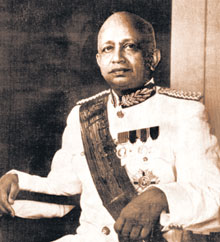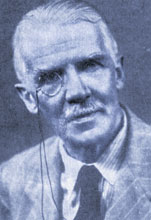Soulbury is a familiar name in Sri Lanka's recent history. Viscount Soulbury had a lot to do in the last stages of the British
colonial government and the formative years after Independence.
The constitution leading to the country gaining Independence was the work of a Royal Commission appointed by the British government under the chairmanship of Lord Soulbury.
(Sir Frederick Rees, Principal of the University College of South Wales and Sir Frederick Burrows, President of the National Union of Railwaymen and afterwards Governor of Bengal were the other two members). Soulbury had held Cabinet office in Conservative administrations and was later Chairman of the Assistance Board and Chairman of Burnham Committees.
 |
| Sir Oliver Goonetilleke |
When the Soulbury Commission came here in December 1944, the Board of Ministers who had submitted a draft for constitutional reforms earlier,
officially boycotted it, though most of them
informally met the Commissioners and accompanied them on their inspection tours. The Commission report was published in September 1945, followed by a White Paper outlining the decisions of the British government. The new constitution was offered "as a foundation upon which may be built a future Dominion of Ceylon." The State Council accepted it by a convincing majority of 51 votes to 3.
Under the new constitution the Governor was replaced by a Governor-General who was appointed on the decision of the Government of Sri Lanka. Previously the Governor was chosen by the British Government in London. Following the general election under the Soulbury Constitution, Governor Sir Henry Monck-Mason Moore continued as Governor-General who also saw the country gaining Independence. When he decided to retire, Lord Soulbury was invited to be Governor-General. He arrived in June 1949 and served until 1954.
On July 17, 1954 the first Sri Lankan Governor-General, Sir Oliver Goonetilleke (1892-1978) took over from Lord Soulbury. "Circumstances have taken me through life from being the son of a humble postmaster to serving as the first Ceylonese Governor-General of my country. In the same period, this lovely island of Ceylon has grown from a mere Crown Colony to a fully independent nation, and a model for developing and newly emerging countries. For a multi-racial and multi-religious society, Ceylon, in spite of all difficulties and setbacks, presents an inspiring example of harmonious progress," Sir Oliver wrote in the foreword to his biography (1969).
Having served in
government service as Auditor-General (1931), Civil Defence & Food Commissioner (1942 – during World War II) and Financial Secretary (1945), Sir Oliver was picked by first Prime Minister D. S. Senanayake as Minister of Home Affairs & Rural Development in the 1947 Cabinet. He did not face the general election but was nominated to the Senate of which he was Leader. He served as the first High Commissioner in UK after Independence (1948-51) but came back to join the Cabinet as Minister of Agriculture & Food. In 1953, he was appointed Minister of Finance and the following year saw him moving to Queen's House. Universally accepted as a foremost strategist, he was very close to D. S. Senanayake with whom he planned the path to Independence.
 |
| Lord Soulbury |
When Queen Elizabeth visited Ceylon in early 1954, Prime Minister
Sir John Kotelawela advised Her Majesty to appoint Sir Oliver as Governor-General in succession to Lord Soulbury. Sir John has gone on record as saying that he did so because he could think of no one better qualified for that high office.
Although the Governor -General's post was largely a ceremonial one, Sir Oliver acted differently.
With years of experience he was always ready to offer advice to the Prime Minister and even handle delicate situations in the day to day administration. One example of this role was when Prime Minister S. W. R. D. Bandaranaike wanted Sir Oliver to administer the country after declaring a state of emergency after ethnic riots against Tamils in 1958.
This is how Sir Oliver himself related how he set about the task: "Army, navy and air force personnel were called in to help the police to restore order, a curfew from 6 p.m. to
6 a.m. was proclaimed and the death penalty for looters announced. The armed services and the police, themselves armed for the occasion, did a magnificent job of work from the afternoon of May 27 (1958). Their orders were to shoot to kill, and by nightfall I was informed that the city of Colombo up to Victoria Bridge in the north and Wellawatte in the south had been cleared. The forces were on duty right through the night and there was no sleep for me too at Queen's House."
Renowned journalist
H. A. J. Hulugalle summed up that Sir Oliver reached eminence by a combination of mental ability, physical energy and a happy knack of being always there. |


